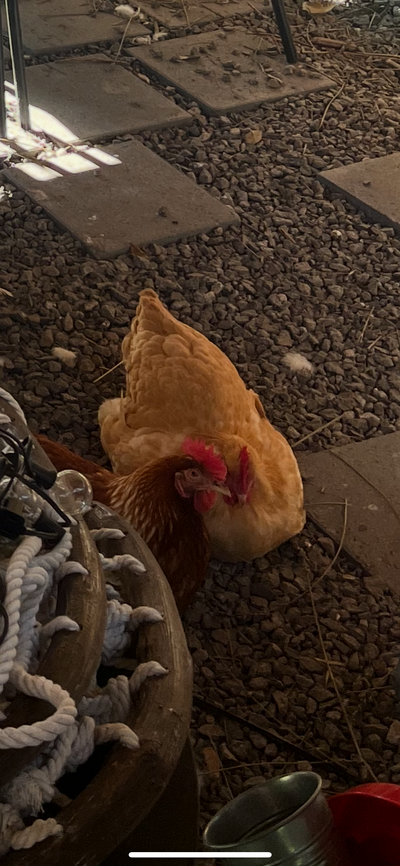CharlieBaby
Songster
- Jun 23, 2020
- 70
- 39
- 108
History
My two year old ISA Brown hen, Candy, has had persistent vent gleet for a few months. Other than a messy bum and slightly thin egg shells, she was acting normal. I added acidified copper sulfate to her water, bathed her, and gave probiotics last month, but the vent gleet continued.
Current symptoms
She has shown a rapid decline over the past three days, with the following symptoms:
She has tried and failed to lay; I can't clearly feel an egg or specific matter when palpitating her abdomen or gently feeling inside her cloaca. Her eggs shells were thinner than usual before she stopped laying. I have not seen a lash egg. She is sensitive to me massaging or applying pressure to her abdomen. Her abdomen feels much harder than the ascites belly I have seen in other hens. When I pick her up, she makes a squirting sound and strains. She is pooping at regular intervals, brown solid poop with very watery white urates. Her crop is watery and squishy in the morning, but doesn't smell sour.
Diet
Last month, she and her flockmates transitioned from Kalmbach 16% Protein Flock Maintainer pellets to Nutrena Feather Fixer pellets. I offer their feed in dry and "mush" form along with fresh water, oyster shells, and grit. Very occasional treats include wheat grass, kale, dried mealworms, and plain coconut yogurt.
Suspected diagnosis
I paid for a fecal exam which ruled out parasites but showed "there were a fair amount of yeast, both 'budding' and 'non-budding'. This indicates multiple stages of development of yeast." I suspect she has a yeast infection that has spread throughout her body and may have triggered reproductive issues common for her high production breed (EYP, salpingitis, egg binding, cancer, impacted oviduct).
Current treatment
She is on day three of oral miconazole (cream), calcium, Baytril, and Epsom baths, but symptoms are worsening. I cannot afford additional vet costs, but I will do all I can to help her. The goal is to nix the underlying infection(s) and decrease abdominal swelling, if possible.
Other ideas to try
In addition to continuing with the treatment above (bolded), I'm considering:
Open to general input, too. Here are some specific questions:
My two year old ISA Brown hen, Candy, has had persistent vent gleet for a few months. Other than a messy bum and slightly thin egg shells, she was acting normal. I added acidified copper sulfate to her water, bathed her, and gave probiotics last month, but the vent gleet continued.
Current symptoms
She has shown a rapid decline over the past three days, with the following symptoms:
- A very hard, distended abdomen
- Not laying
- Lethargic
- Squishy crop not emptying
- Loss of appetite
- Straining
- Sticky vent feathers
She has tried and failed to lay; I can't clearly feel an egg or specific matter when palpitating her abdomen or gently feeling inside her cloaca. Her eggs shells were thinner than usual before she stopped laying. I have not seen a lash egg. She is sensitive to me massaging or applying pressure to her abdomen. Her abdomen feels much harder than the ascites belly I have seen in other hens. When I pick her up, she makes a squirting sound and strains. She is pooping at regular intervals, brown solid poop with very watery white urates. Her crop is watery and squishy in the morning, but doesn't smell sour.
Diet
Last month, she and her flockmates transitioned from Kalmbach 16% Protein Flock Maintainer pellets to Nutrena Feather Fixer pellets. I offer their feed in dry and "mush" form along with fresh water, oyster shells, and grit. Very occasional treats include wheat grass, kale, dried mealworms, and plain coconut yogurt.
Suspected diagnosis
I paid for a fecal exam which ruled out parasites but showed "there were a fair amount of yeast, both 'budding' and 'non-budding'. This indicates multiple stages of development of yeast." I suspect she has a yeast infection that has spread throughout her body and may have triggered reproductive issues common for her high production breed (EYP, salpingitis, egg binding, cancer, impacted oviduct).
Current treatment
She is on day three of oral miconazole (cream), calcium, Baytril, and Epsom baths, but symptoms are worsening. I cannot afford additional vet costs, but I will do all I can to help her. The goal is to nix the underlying infection(s) and decrease abdominal swelling, if possible.
Other ideas to try
In addition to continuing with the treatment above (bolded), I'm considering:
- Adding nystatin powder (I have this on hand)
- Attempting to drain fluid from her abdomen (I know how)
- Trying an oral Epsom flush (read about in posts about vent gleet by @azygous)
- Adding meloxicam for inflammation (I have this on hand but am concerned about suppressing appetite)
Open to general input, too. Here are some specific questions:
- Have you seen persistent vent gleet cause or trigger reproductive ailments such as EYP, salpingitis, or egg binding?
- Can oral Epsom tubing be done any time of day? Is it okay to give when crop is slow to empty and abdomen is hard? Should food be withheld for a period of time?
- Can powdered nystatin be mixed with miconazole cream? Can I deliver powdered nystatin in capsules?
- Is an Epsom salt enema or any enema ever a good idea in cases of vent gleet and EYP, salpingitis, or egg binding to help expel potential egg material in abdomen?
















